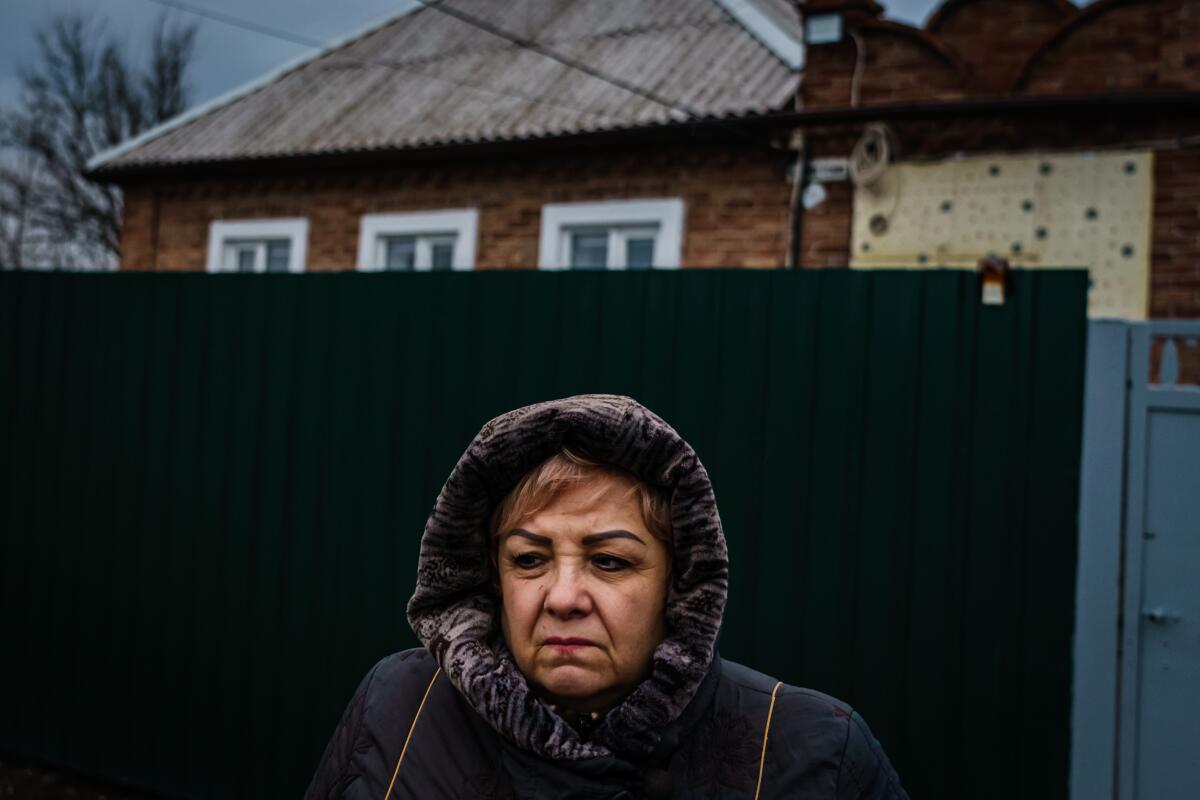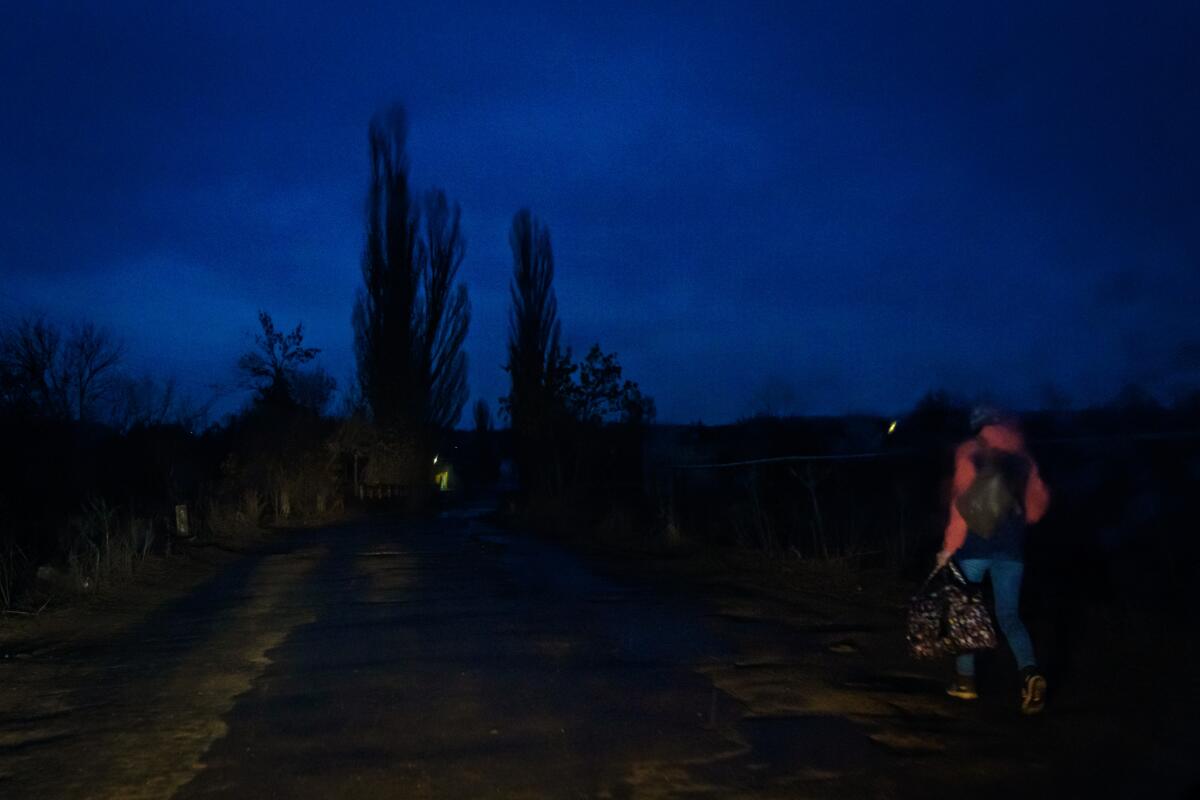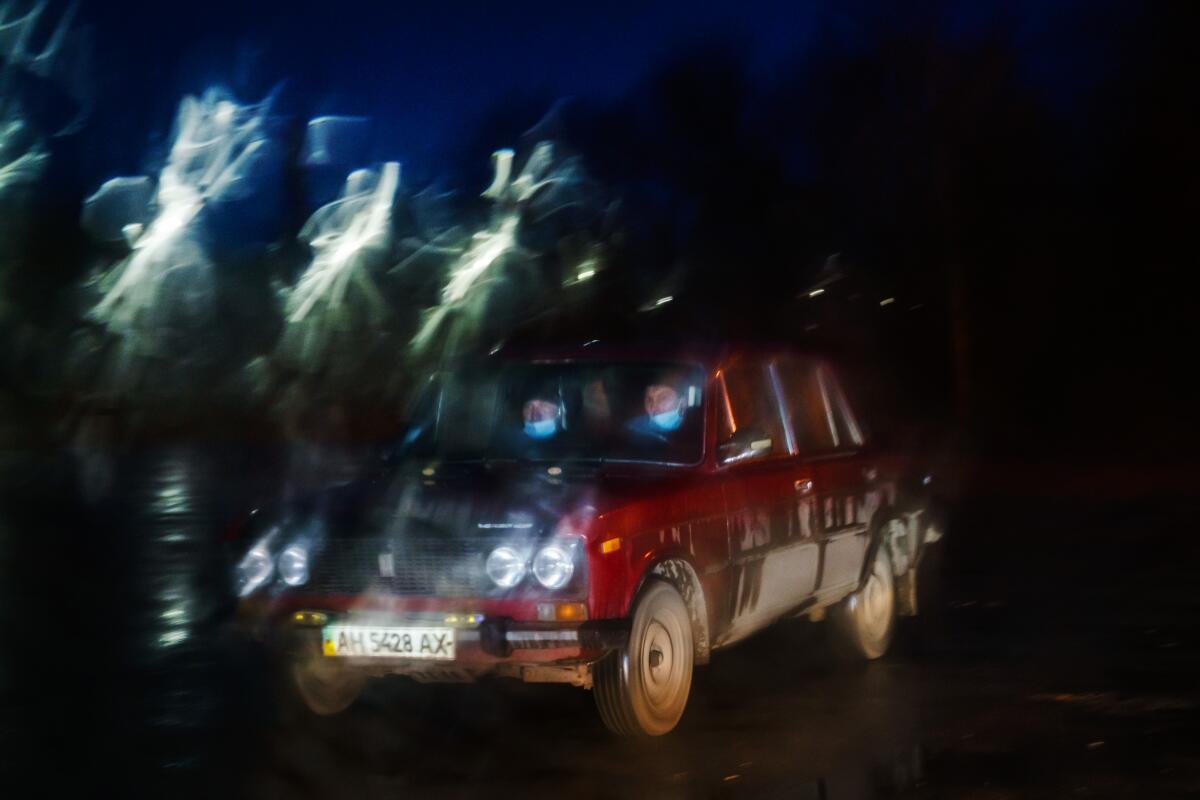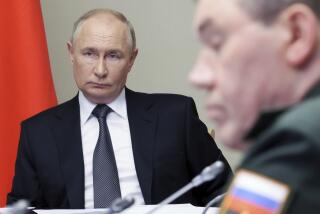Will war come to a town called New York in Ukraine?

- Share via
NEW YORK, Ukraine — The bakery in the center of town offered poppy seed babka-like pastries and breads of various shades. The baker seemed reluctant to speak before blurting out that the shelling — always present but also far away — increased in recent days. She would have said more, but a tall, burly pensioner wearing an imposing gray coat and a black fur hat jumped in with his own opinion:
“Situation getting worse,” he said, alluding to the prospect that Russian troops may be on their way, before walking out without waiting for a response.
Not far away, in the central square, Dmitri Sergeivich, a 44-year-old who works at the nearby chemical plant, sat with two of his friends, joking and discussing the affairs of the day in the suddenly cool evening air. He gave an easy smile that belied his midlevel-street-enforcer looks.
“I live on a nearby mountain that looks into Donetsk, so I’m not worried,” he said, pointing to a sprinkling of houses on a nearby hill. Besides, he was sure no one would attack the chemical plant, which is owned by Ukraine’s richest oligarch, Rinat Akhmetov. It produces phenol, a toxic chemical precursor, and is often belching noxious fumes into the air. What would happen if an artillery round smacked into it?

“It wouldn’t be good,” he said, a serious undertone to his deadpan delivery. He added that though a lot of people had left the town in the eight years of war, and more were joining them now during this escalation, he intended to stay and take care of his 11-year-old daughter. Besides, the plant was still producing and exporting its goods to Turkey and elsewhere.
War may be headed in his direction but Sergeivich showed a sort of equanimity that has become a typical sight in Kyiv and other big cities these past few weeks. It was notable to find it here in New York, a few miles from the contact line that for years marked the tense stalemate between the Ukraine government and its Moscow-backed separatist adversaries — and a potential target for a Russian assault in its “peacekeeping” mission in Donbas.
Russia’s upper house of parliament unanimously approved that mission in a theatrics-heavy show of fealty to Russian President Vladimir Putin on Tuesday, setting the stage for the deployment of Russian troops to eastern Ukraine a day after Putin formally recognized the independence of two breakaway republics. The European Union reported that troops had entered the separatist region earlier in the day. The question was how far into Ukraine they would push.
“The adoption of the decision by the Federation Council today … is aimed at establishing peace in the Donbas, at stopping this bloody civil war, in order to prevent further shelling of peaceful villages and civilians,” said upper chamber Speaker Valentina Matvienko, according to a report from Russian state news operator Tass. The step would also pave the way for establishing military bases on those territories.
A press briefing with Putin after the vote brought fresh fears of an all-out war in Ukraine when he told reporters that Russia’s recognition of the two self-proclaimed republics encompassed a wider swath of territory than the separatists now hold.

His statement raises the specter that Russian troops could imminently penetrate farther into Ukraine, well beyond the “line of contact” between Ukrainian forces and the pro-Moscow separatists, who hold approximately a third of the Donbas. Putin also rejected the Minsk agreements, the accords that brought a stuttering cease-fire to eastern Ukraine in 2014, but with no proper resolution.
“The Minsk agreements do not exist now, we recognized the DNR and LNR,” Putin said, referring to the breakaway states by their official names, the Donetsk People’s Republic and the Luhansk People’s Republic.
Putin’s actions on Tuesday brought a chorus of international denunciations as well as a raft of economic sanctions from the U.S., U.K. and European Union. The most palpable blow, however, came from German Chancellor Olaf Scholz, who said he would halt authorization of the Nord Stream 2 pipeline, which was set to provide a significant chunk of Europe’s gas.
Elsewhere, NATO Secretary-General Jens Stoltenberg said Russia was moving from “covert attempts to destabilize Ukraine to overt military action,” adding that the crisis in Ukraine was the “most dangerous moment in European security for a generation.”
The diplomatic barbs continued even as fighting persisted along the contact line in the Donbas. Shelling from separatist forces struck a power station in the Ukrainian-controlled town of Shchastia, starting a fire and knocking out heat and electricity. The Ukrainian Defense Ministry said Tuesday that up to 9 p.m., territories under Ukrainian control had been shelled 80 times from the separatist region.
The Defense Ministry said that two of its soldiers were killed Tuesday and 12 others wounded in separatist shelling over the 24 hours before — adding to a toll of casualties in the conflict over the Donbas. Despite the recent escalation, Ukrainian President Volodymyr Zelensky insisted — as he had many times in past weeks — that there would not be a full-on invasion.
“With regards to being on a military footing, we understand there will be no war,” Zelensky said. “There will not be an all-out war against Ukraine, and there will not be a broad escalation from Russia. If there is, then we will put Ukraine on a war footing.”
Russian diplomats believe Kyiv is already there. In a lengthy statement on Tuesday, the Russian Embassy said: “In the current circumstances, our first priority is to take care of Russian diplomats and employees of the Embassy and Consulates General.”
“To protect their lives and safety, the Russian leadership has decided to evacuate the personnel of Russian foreign missions in Ukraine,” the statement said.
Later, video uploaded to social media showed smoke coming out of the Russian Embassy building in the capital. The footage could not be verified by The Times.
But elsewhere it appeared that the waiting game of the last few weeks would continue for a few more days, and Ukrainians would endure it as they had for eight years, as they keep repeating to visiting journalists’ inquiries. Still, the rumors of war seem too loud to ignore, even for someone like Sergeivich.
“There are different ideas for this territory,” he said, referring to the Donbas.
“But I hope it will return to Ukraine.”
More to Read
Sign up for Essential California
The most important California stories and recommendations in your inbox every morning.
You may occasionally receive promotional content from the Los Angeles Times.














